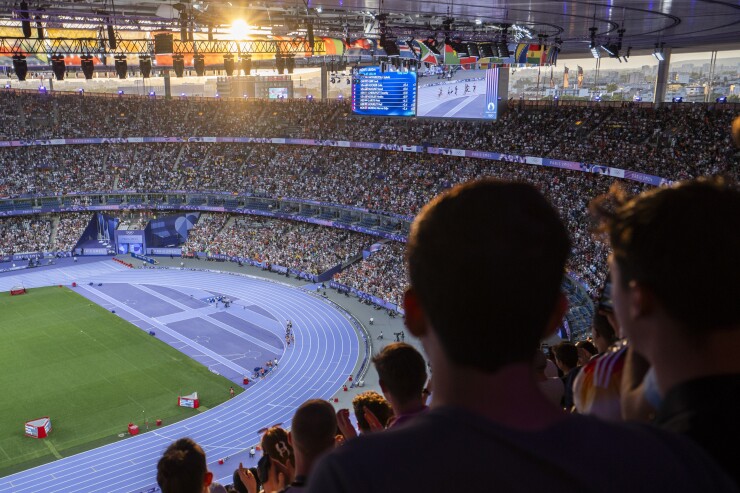
Games have been around forever
Displaying new payment options in a central location served three goals for Visa. It extended the price which benefited Visa; increased small business acceptance in the Visa network; and exposed visitors to payment methods they may want to use when they return home.
In an effort to build acceptance of contactless payments, the card network deployed more than 3,500 terminals in small businesses in the Paris metropolitan area over the past three years. For the Paris Olympics, Visa brought together small businesses with the VisaGo app to connect spectators directly with businesses.
In addition to the rise in contactless payments, these businesses saw a 26% increase in sales from Visa customers, according to the card network.
US consumers account for 29% of Paris’ domestic spending, making Americans the largest source of tourist revenue. This could encourage more use of contactless payments in the US, which has adopted non-contact payments
Japanese consumers made the fastest increase, more than doubling spending in Paris on the same weekend last year.
Integrating contactless payments into the VisaGo app combines two new technologies for the card brand. Visa
“International sports venues like the Olympics create opportunities to test and demonstrate new technology. And it’s a temporary venue so there are no long-term costs,” said Thad Peterson, a strategic consultant for Data Insights. “It’s also a global sampling and branding tool, exposing thousands of affluent travelers around the world to brand technology.” VisaGo integrates payments and purchases with related content, such as content about athletes who are part of Visa’s marketing campaigns, creating an opportunity to collect more customer experience beyond payment.
“Imagine showing up to an event and your child being handed a jersey of their favorite player while your family finds seats where cold drinks and hot food are already paid for and waiting,” he said. Rob Cameron, Global Head of Acceptance Solutions, Visa. “This is what we’re building.”
Visa’s mission is to expand the use of new payment methods beyond the actual event, including mobile shopping, payments and sharing of content related to social media, fantasy sports, fan clubs, bars and restaurants, Cameron said, adding that this acceptance could extend to the Visa network. of about 130 million traders.
“The future of the fan experience is everything, and the opportunity to connect with fans where they are and where they are has probably never been greater,” said Cameron.
The VisaGo app, available in the App Store and Google Pay Store, includes integration with Apple Wallet, enabling biometric authentication and tokenized payments, according to Michael Seaman, CEO of Swipesum, a payments company partnered with Visa at the Olympics. technology. Tokenization means creating individual card numbers for each transaction, in theory making the card unusable if stolen. Another part of the app includes a digital map to places around Paris and recommendations for shopping and paying in those places.
“The important thing here is to make everything seamless,” Seaman said, adding that the integration of the merchant space, buying, selling and payment will be the way lik Payment companies and financial institutions will find a connection with customers in the future.
Other Visa-related sports include the FIFA World Cup and football-related events. Rival Mastercard is linking its marketing and payment development to sporting events, including
Payment technology companies are also using games as a way to showcase new products. The no-name technology firm Appetize used its ordering and payment system to
The policy can have a negative effect. Google recently pulled an Olympic-themed ad featuring its artificial intelligence product Gemini writing a fan letter to an Olympian. The ad was criticized for allegedly substituting a bot for a young fan’s creativity.
When Google argued that the ad showed Gemini as a form of branding, it pulled the ad from the Olympics.
“The risk is that the new technology will work poorly and the audience will have a less-than-good experience,” Peterson said.
#Olympics #disrupting #payment #technology